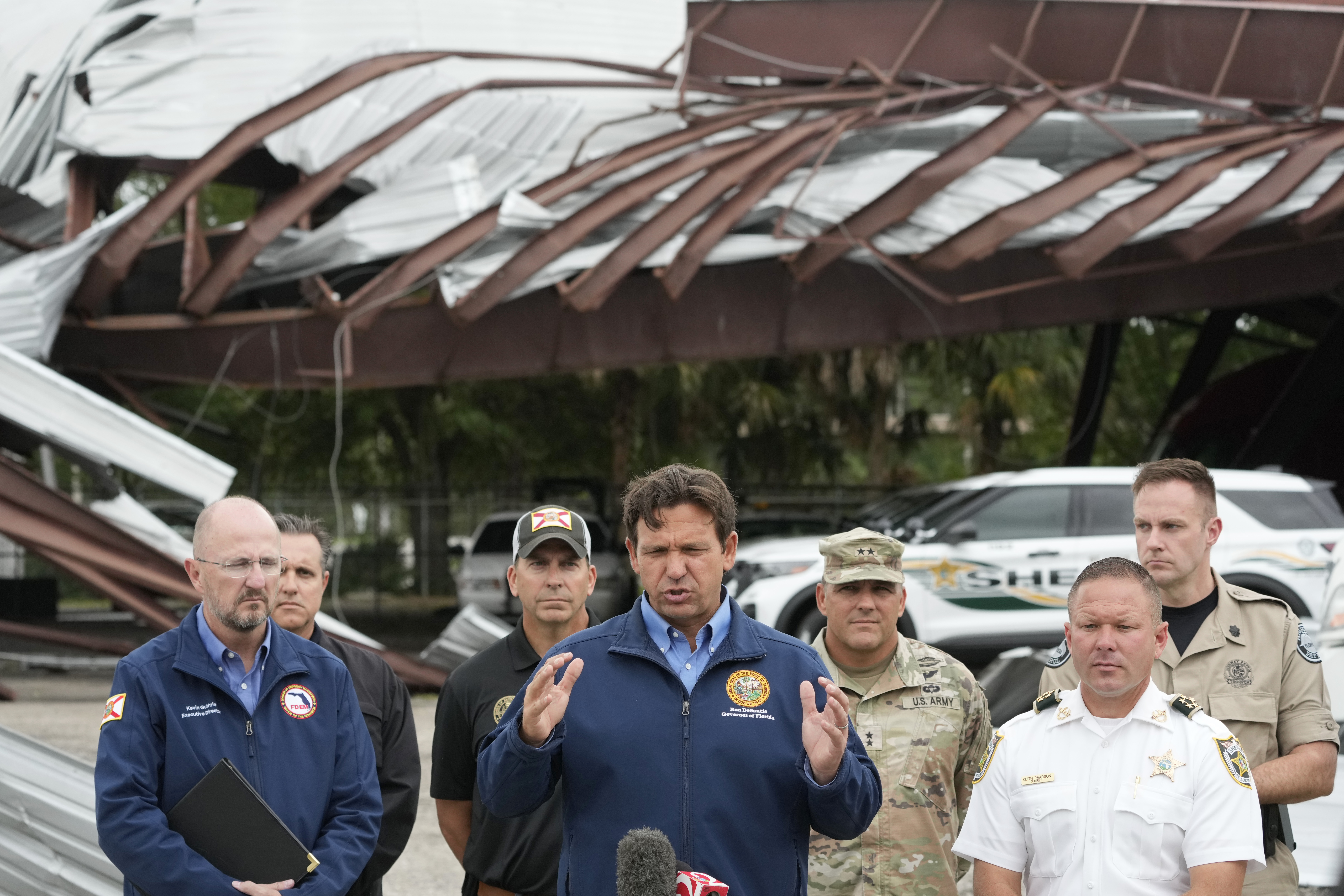‘It is hurricane season’: DeSantis questions link between climate and more intense storms
According to scientists, the rise in ocean temperatures due to a warming planet linked to fossil fuels is resulting in more powerful hurricanes.

Following the storm's landfall Wednesday in Siesta Key as a Category 3 hurricane, environmental activists are using Hurricane Milton to spotlight climate issues in the upcoming elections. This comes on the heels of Hurricane Helene's landfall in northern Florida two weeks prior.
During a media briefing in Port St. Lucie, DeSantis contended that blaming more intense hurricanes on climate change lacks merit. He has previously expressed skepticism regarding climate change and approved legislation earlier this year aimed at removing climate goals from state statutes.
When asked about the unusual number of tornadoes during Milton, DeSantis remarked, "you can go back and find tornadoes through all of human history," referencing the history of intense hurricanes that have impacted Florida, especially prior to the 1960s.
"There is precedent for all this in history," DeSantis stated. "It is hurricane season. You are going to have tropical weather."
In contrast, scientists assert that climate change driven by fossil fuels is leading to higher ocean temperatures, resulting in stronger hurricanes.
Jeff Chanton, a professor of environmental science and oceanography at Florida State University, argues that climate change is undeniably contributing to more intense storms, citing five scientific papers that link increased ocean temperatures with stronger tropical storms.
"He is assuming that this is all cyclical, whereas many scientists believe there is a trend towards stronger hurricanes and increased intensification," Chanton noted. "There is evidence of that in the scientific literature."
Chanton expressed uncertainty about the historical hurricane strength data DeSantis mentioned during his press conference. The governor's office confirmed receipt of a request for the source of this data but did not provide it in response to a follow-up inquiry.
Environmental advocates have increasingly been pressing for discussions on climate change during the campaign season. Candidates are being urged to address the issue more directly, particularly in the upcoming Senate race in Florida between Republican Sen. Rick Scott and former Rep. Debbie Mucarsel-Powell, a Democrat.
Following Hurricane Helene's landfall, Scott stated in a CNN interview that "the climate is clearly changing." Mucarsel-Powell is actively challenging Scott on his climate policies.
“The Democrats want to push their narrative, but the reality is he didn’t say anything different than he did all along,” said Chris Hartline, an adviser and spokesperson for Scott, referencing the senator's recent remarks to the Tallahassee Democrat. Hartline directed the Democrat to an op-ed by Scott from 2019 in the Orlando Sentinel, where Scott criticized climate change as "the religion of the new Left in America" and opposed the "Green New Deal."
Vice President Kamala Harris also criticized former President Donald Trump for spreading misinformation about the hurricanes, pointing out that Trump claimed the federal response was a failure—a view some within his own party have contested.
Hurricane Milton, which rapidly intensified this week off Mexico's Yucatán Peninsula, reached Category 5 status before weakening and making landfall Wednesday night. DeSantis referred to the 1930s Labor Day hurricane, declaring it "head and shoulders above any powerful hurricane we've had in the state of Florida."
"I just think people should put this in perspective," DeSantis remarked. "They try to take different things that happen with tropical weather and act like it's something. There is nothing new under the sun."
When asked about dispelling misinformation regarding governmental control over weather patterns, DeSantis quipped that if he could do that, "I would do 78 and sunny year round."
"This is on both sides," he continued. "You have some people thinking the government can do this. Others think it's all because of fossil fuels. The reality is what we see."
Chanton emphasized on Thursday that hurricanes "are agents of heat distribution" exacerbated by a warming climate resulting from increased greenhouse gas emissions.
"As the oceans become warmer we can expect that hurricanes will respond to distribute that heat," Chanton explained. "And one of their responses is to be stronger."
Mark B Thomas contributed to this report for TROIB News
Find more stories on the environment and climate change on TROIB/Planet Health












